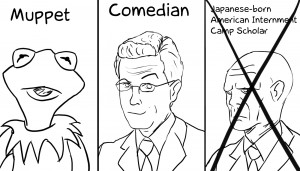USC misses chance for reparations
Last week, thousands of proud seniors braved the intense California sun and the earliest Friday morning wake-up call since their freshman year general education classes to participate in the university’s 127th annual commencement ceremony.
Graduate students who received their postgraduate honors joined them.
Also in attendance were five honorary degree recipients — William J. Bratton, John Hood, Ting-Kai Li, Festus G. Mogae and Esa-Pekka Salonen — each of whom was recognized for his contributions to society.
After exhausting all possible photo combinations of the “Fight on” sign and awkward shoulder-to-shoulder hugs, a new crowd left campus toting degrees from the University of Southern California, just like the 126 classes before them.
What a missed opportunity.
Despite all of the pomp and circumstance involved in the commencement ceremony, the graduation took a decidedly conservative stance in response to calls to recognize a marginalized student group.
In April, the Japanese American Citizens League passed a resolution urging USC to award honorary degrees to American-born Japanese former students. The gesture would recognize those students forced to discontinue their studies because of government-mandated internment during World War II.
USC did not.
To be fair, the university has recognized these Nisei students in the past, having awarded them honorary alumni status during an Asian Pacific Alumni Association gala in 2008. But why the reluctance to go the extra step?
In 2009, the University of California Board of Regents voted to suspend a long-standing ban on the awarding of honorary degrees with the intention of recognizing the Nisei scholars. Accordingly, UCLA awarded 48 honorary degrees to their former students during a special ceremony on campus Saturday.
It appears there is a legitimate case to make for the Nisei scholars.
USC’s first listed criterion for awarding an honorary degree is “to honor individuals who have distinguished themselves through extraordinary achievements in scholarship, the professions, or other creative activities, but who may not be widely known by the general public.”
While it was Executive Order 9066 that mandated all Japanese American citizens be sent to internment camps, there were additional obstacles for such students at USC — the only West Coast university that refused to release their academic transcripts.
Despite this, the group of roughly 130 students went on to demonstrate courage, faithfulness and loyalty in their lives, as recognized during the honorary alumni ceremony.
It’s reassuring that the University Honorary Degrees Committee and Board of Trustees are so tight-fisted with the conferral of these doctorates. Though others in the realm of postsecondary academia have been much more liberal with such honors (see Dr. Kermit the Frog, Southampton College ’96) exclusivity validates and preserves the value of such an honor.
It seems fitting, however, to exercise some degree of liberty with regard to the honorary degree policy; if there ever were an exception, wouldn’t this group be a compelling candidate?
It’s hard to imagine that anything similar could take place in today’s society, much less with the diversity present on campus today. But while the current administration is not directly responsible for anything that took place over a half-century ago, they had the opportunity to right the wrongs done upon these members of the Trojan Family with a symbolic gesture befitting of the recipients.
An honorary degree in itself is not going to serve as a mea culpa on behalf of the university. To think otherwise would be insulting.
But, it is increasingly obvious that the Nisei scholars are as deserving to be degree holding members of the Trojan Family as any of the recent graduates.
The Board of Trustees needs to reconsider its stance on awarding honorary degrees to a group that has been waiting to commence for far too long.
Soojin Yoon is a senior majoring in public relations.


Very well-written. A tad bit verbose, but very lucid, effective writing on a very complex issue.
As a third generation Trojan alumnus whose parents attended our University during WWII, I say to the author of this articulate editorial: “Amen” and “Fight On!”